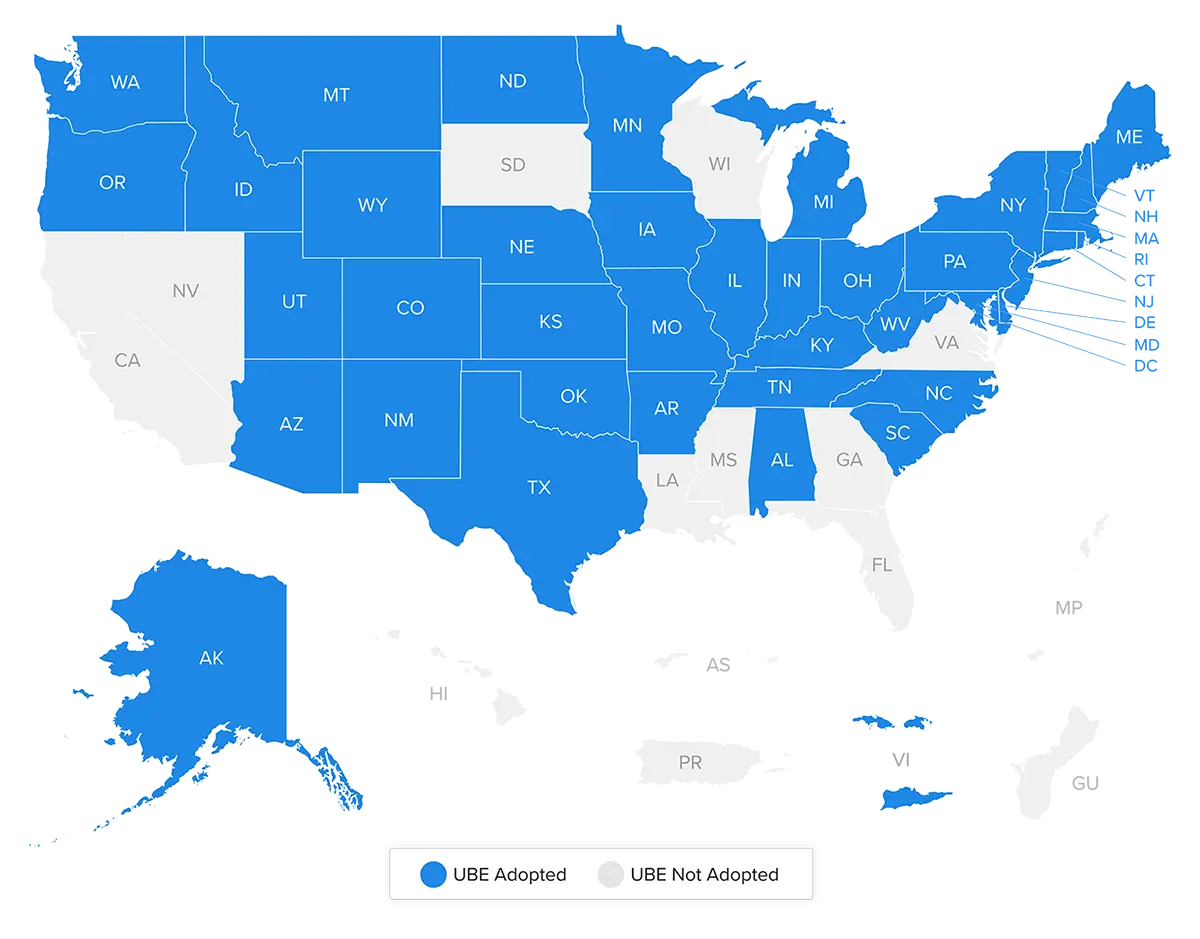Each state has unique bar exam requirements. Most have adopted the Uniform Bar Exam (UBE®), while others have retained their original format (Non-UBE). Some are now shifting to the NextGen bar exam. Despite the differences, nearly all states have similar educational requirements and application processes.
What’s the Difference Between UBE and Non-UBE States?
UBE states administer a standardized exam consisting of 3 components: the Multistate Bar Exam (MBE®), the Multistate Essay Exam (MEE®), and the Multistate Performance Test (MPT®). This structure allows you to transfer scores between UBE jurisdictions easily.
However, non-UBE states may or may not incorporate these UBE components and include unique, state-specific tests. As a result, transferring scores from non-UBE states to UBE jurisdictions is generally not possible or requires a more complex process.
UBE State-Specific Requirements
The table below lists jurisdictions that have adopted the UBE. If you take the bar exam in Arizona while your friend takes it in Wyoming, you’ll be taking the same exam. However, the requirements you must meet to sit for the exam will vary.
Select a state or jurisdiction for a detailed guide on requirements, fees, and more.
Non-UBE State-Specific Requirements
The jurisdictions below have continued to administer their own bar exam. For example, Louisiana tests civil law rather than the common law used in most other U.S. states, ensuring candidates are prepared for its unique legal framework.
Select a state or jurisdiction for a detailed guide on requirements, fees, and more.
| UBE State-Specific Bar Exam Information | ||
|---|---|---|
| California | Hawaii | Virginia |
| Delaware | Louisiana | Wisconsin |
| Florida | Mississippi | Northern Mariana Islands |
| Georgia | Nevada | Palau |
| Guam | South Dakota | Puerto Rico |
Non-UBE Local Components
Non-UBE jurisdictions often use some UBE components but add state-specific parts to test local laws. For example, Louisiana and Puerto Rico don’t use any UBE components due to their unique legal systems, while others, such as Hawaii, use all UBE components but also include a state-specific test.
| Jurisdiction | MBE | MEE | MPT |
|---|---|---|---|
| California | |||
| Delaware | |||
| Florida | |||
| Georgia | |||
| Hawaii | |||
| Louisiana | |||
| Mississippi | |||
| Nevada | |||
| South Dakota | |||
| Virginia | |||
| Wisconsin | |||
| Guam | |||
| Northern Mariana Islands | |||
| Palau | |||
| Puerto Rico |
General Requirements to Take the Bar Exam
General bar exam requirements are similar across the U.S. Most require an accredited law degree, proof of residency, and a character investigation, but details vary. The requirements below are general. For detailed information, select the appropriate jurisdiction in the tables above.
Education
Most states require you to graduate from a law school accredited by the American Bar Association (ABA). Some states may accept graduates from non-ABA law schools if they meet additional criteria, such as completing extra coursework or passing state-specific assessments.
Character and Fitness
A character and fitness assessment evaluates whether you meet the ethical and moral standards required for legal practice. In most jurisdictions, this assessment begins before the bar exam but is completed afterward.
However, some jurisdictions require you to fully complete and pass the character and fitness assessment before you can sit for the bar exam. Those jurisdictions are:
- Georgia
- Idaho
- Iowa
- Kentucky
- Mississippi
- Montana
- Ohio
- Palau
- Rhode Island
- Utah
- Washington
Multistate Professional Responsibility Exam
The Multistate Professional Responsibility Exam (MPRE®) is a 60-question, multiple-choice test that evaluates knowledge of professional ethics and conduct based on the ABA's standards.
Law students are encouraged to take the MPRE during the summer, often in their 2L or 3L year, to focus fully on preparation and allow time for a retake if needed. Some states require a passing MPRE score before sitting for the bar exam, while others only need it for bar admission.
Score Transfer
Candidates who take the UBE may transfer their scores between UBE jurisdictions if they meet the minimum score requirement set by the receiving state. Score validity and transferability depend on state rules, which often require that the score be used within a certain time frame, usually 3 to 5 years.
Scheduling
Bar exams are typically held twice a year, in February and July. You must apply through your State Bar or the National Conference of Bar Examiners (NCBE®) by the specified deadline. Exam locations and seating availability may vary, so early registration is recommended to secure a spot and avoid late fees.
Admission Without Examination
Some states offer admission without examination for attorneys licensed in another jurisdiction (also known as reciprocity or admission on motion). You must usually meet requirements such as years of practice, good standing in your current jurisdiction, and, in some cases, additional state-specific coursework or ethics exams.
Foreign Students and Attorneys
International candidates may qualify to take the bar exam in some states if they have completed their law degree in a foreign jurisdiction recognized by that state. These candidates must often have their credentials evaluated and may be required to complete additional legal education or coursework.





